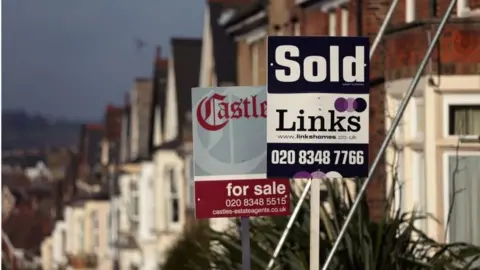House prices see fastest growth rate in January for 17 years
 PA Media
PA MediaHouse prices have risen at the fastest annual pace for a January in 17 years, amid "robust" demand and low supply, according to lender Nationwide.
The building society said prices rose by 11.2% year-on-year and by 0.8% between December and January.
Affordability is already a key issue with house prices rising much faster than wages throughout the pandemic.
Nationwide said a deposit now constitutes a record percentage of a first-time buyer's salary.
"A 10% deposit on a typical first-time buyer home is now equivalent to 56% of total gross annual earnings, a record high," said the building society's chief economist, Robert Gardner.
"Similarly, a typical mortgage payment as a share of take-home pay is now above the long-run average, despite mortgage rates remaining close to all-time lows."
The average price of a property in the UK was £255,556 in last month - up from £254,822 in December - as demand remained "robust," Mr Gardner said.
"Mortgage approvals for house purchase have continued to run slightly above pre-pandemic levels, despite the surge in activity in 2021 as a result of the stamp duty holiday, which encouraged buyers to bring forward their transactions to avoid additional tax.
"Indeed, the total number of property transactions in 2021 was the highest since 2007 and around 25% higher than in 2019, before the pandemic struck.
"At the same time, the stock of homes on estate agents' books has remained extremely low, which is contributing to the continued robust pace of house price growth."
Finances under pressure
However, the Nationwide predicts the increase in house prices will slow this year as property becomes less affordable.
Mr Gardner said the outlook for the housing market "remains uncertain", but house price growth had "outstripped earnings growth by a wide margin since the pandemic struck".
He added that with interest rates expected to rise in the coming months affordability could be hit further.
The Bank of England raised its key interest rate to 0.25% in December, and it is expected to make further increases this year. The Bank's Monetary Policy Committee is due to make its next announcement on rates on Thursday.
"This will further reduce housing affordability if it feeds through to higher mortgage rates, although to date a significant proportion of the rise in longer term interest rates seen in recent months has been absorbed by lenders," Mr Gardner said.
Mr Gardner said reduced affordability would be likely to dampen market activity and house price growth this year "especially since household finances are also coming under pressure from sharp increases in the cost of living"- with inflation hitting 5.4% in December, its fastest pace since 1992, and set to rise further in the coming months as energy prices go up.
